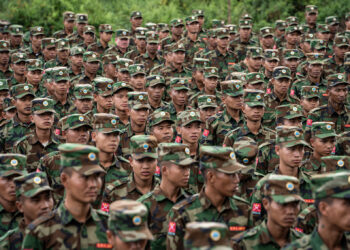The Kachin Independence Organization (KIO) has vowed to convert its suffering over a deadly regime airstrike into courage to escalate its battle against Myanmar’s junta, while its allies called on other ethnic armed organizations to step up the fight.
KIO information officer Colonel Naw Bu confirmed to The Irrawaddy on Tuesday that civilians as well as officials of KIO’s armed wing, the Kachin Independence Army (KIA), were among nearly 50 people killed on Sunday evening when junta warplanes attacked a music concert being held to mark the KIO’s 62nd anniversary at a village near Hpakant, Kachin State. At least 55 were injured in the attack and the death toll is expected to rise.
The KIO is a powerful Kachin political organization that has been fighting the Myanmar government and military for greater state autonomy.
The KIO offered condolences for the victims on Tuesday, the organization’s 62nd anniversary, saying only that “many civilians and KIA staff were killed.” Among the victims were prominent musicians and businesspeople invited to the concert.
“We will turn this mournful event into revolutionary courage, accelerating efforts to topple the military regime,” said a statement released by the KIO central committee.
The junta’s military confirmed on Tuesday it was responsible for the attack, calling it “necessary action” against the KIA for collaborating with anti-regime resistance groups to attack regime targets in Kachin State. The KIA has been launching military operations alongside People’s Defense Forces (PDFs) in Kachin State since the coup last year.
The junta also claimed the airstrike targeted a KIA Brigade 9-controlled zone that should have been off-limits to civilians. The KIO said the village attacked was not a KIA base, merely a rest area with some shops.
The Northern Alliance military coalition warned all civilians to beware, as the regime’s actions were worsening day by day, and called on the international community to take urgent action. The alliance includes the KIA, Arakan Army (AA), Myanmar National Democratic Alliance Army (MNDAA) and the Ta’ang National Liberation Army (TNLA).
“Now is the time to be mindful of the regime’s tricks, and other ethnic armed groups should act decisively [against the junta] in unity,” said the alliance.
Earlier this year, the junta launched negotiations with 10 out of 21 ethnic armed organizations (EAOs) that it had invited to peace talks. The Northern Alliance and the country’s oldest EAO, the Karen National Union (KNU), were among those who rejected the invitation, as it excluded the anti-regime National Unity Government and its PDF armed wing.
The EAOs who entered peace talks with the junta are the Restoration Council of Shan State/Shan State Army (RCSS/SSA), Arakan Liberation Party (ALP), New Mon State Party (NMSP), Democratic Karen Buddhist Army (DKBA), the KNU/KNLA Peace Council, Pa-Oh National Liberation Organization (PNLO) and the Lahu Democratic Union (LDU), the United Wa State Army (UWSA), National Democratic Alliance Army (NDAA-Mongla) and Shan State Progressive Party (SSPP).
As of Wednesday, none of these groups had condemned Sunday’s deadly airstrike or expressed condolences for the victims.
On Tuesday, the KNU called the attack a “war crime” and vowed to collaborate with other revolutionary forces to root out military dictatorship in Myanmar. The KNU’s armed wing, the Karen National Liberation Army, has been fighting alongside PDFs against the junta in Karen State since the coup last year.
Meanwhile, the NUG and ousted National League for Democracy called on the United Nations and international community to take action against the junta for “repeatedly committing war crimes akin to genocide.”
On Tuesday, the UN mission in Myanmar said it was deeply concerned and saddened since “What would appear to be excessive and disproportionate use of force by security forces against unarmed civilians is unacceptable.”
Diplomatic missions in Myanmar including Australia, Britain, the United States and European Union members said in a joint statement that the airstrikes underscored the military regime’s responsibility for crisis and instability while disregarding its obligation to protect civilians.

















